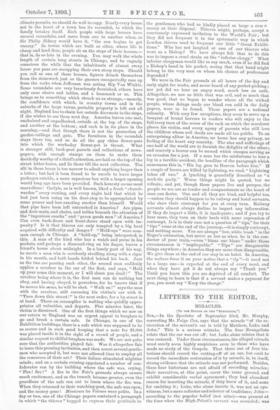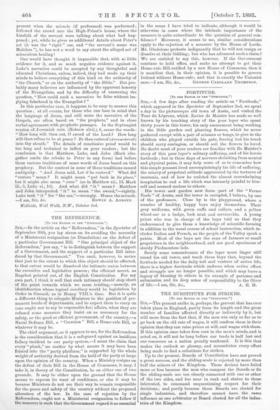LETTERS TO THE EDITOR.
MIRACLES.
[To THE EDITOR OP THE"SPECTATOR."] Sin,—In the Spectator of September 23rd, Mr. Murphy, correcting Mr. Paige Cox, says that the miracle "of the re- storation of the servant's ear is told by Matthew, Luke, and John." This is a serious mistake. The four Evangelists relate that the ear was cut off ; but Luke alone relates that it was restored. Under these circumstances, the alleged miracle must surely seem highly suspicious even to those who have made no study of the Gospels. That three out of four his- torians should record the cutting-off of an ear, but omit to record the immediate restoration of it by miracle, is, in itself, strong evidence that the miracle was not performed. Besides, these four historians are not afraid of recording miracles; their narratives, at this point, cover the same ground, and exhibit considerable verbal agreement ; they had abundant reason for inserting the miracle, if they knew of it, and none for omitting it ; Luke, who alone inserts it, was not an eye- witness, but a mere collector and selector of traditions; John— according to the popular belief (not mine)—was present at the time when the High-Priest's Fervent was wounded ; was present when the miracle (if performed) was performed ; followed the crowd into the High-Priest's house, where the kinsfolk of the servant were talking about what had hap- pened ; yet, while he gives us additional details about Peter's act (it was the " right " ear, and "the servant's name was Malcbus "), he has not a word to say about the alleged act of miraculous healing !
One would have thought it impossible that, with so little evidence for it, and so much negative evidence against it, Luke's narrative could be accepted by any thoughtful and educated Christians, unless, indeed, they had made up their minds to believe everything of this kind on the authority of "the Church," or on the authority of " the Bible." But pro- bably many believers are influenced by the apparent honesty of the Evangelists, and by the difficulty of answering the question, "How could such a narrative be false without im- plying falsehood in the Evangelist P " In this particular case, it happens to be easy to answer this question ; at all events, for those who can bear in mind that the language of Jesus, and still more the narrative of the Gospels, are often based on " the prophets," and in close verbal agreement with prophetic passages. In the Septuagint version of Jeremiah xxix. (Hebrew xlvii.), 6, occur the words : " How long wilt thou cut, 0 sword of the Lord ? How long wilt thou refuse to be at peace P Be thou restored (s19rowarigarmh) into thy sheath." The details of conclusive proof would be too long and technical to inflict on your readers ; but the conclusion is that Matthew, Luke, and John (Mark alto- gether omits the rebuke to Peter in any form) had before them various traditions of some words of Jesus based on this prophecy. But the context in some of these traditions caused ambiguity : " And Jesus said, Let it be restored." What did "restore" mean P It might mean "put back in its place," but it might also mean " cure" (as in Matthew xii., 13, Mark iii., 5, Luke vi., 10). And what did " it " mean ? Matthew and John interpreted " it" to mean " the sword,"—rightly. Luke took " it " for " the ear,"—wrongly. Hence the miracle.







































 Previous page
Previous page